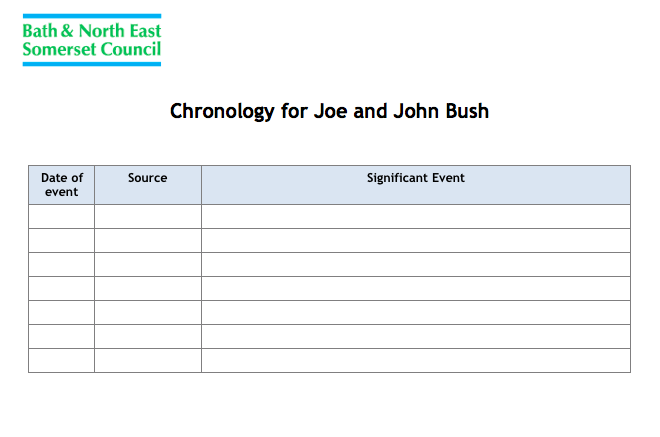The most important part of writing a chronology is understanding WHY we complete them. Often in Social Work, the ‘HOW’ is underpinned by the ‘WHY. There are many reasons to complete a chronology but here are five of the main reasons:
- To understand Children Social Care involvement with the family or child thus far. You need to chronologically detail every Referral (and outcome); Assessment (and outcome); Strategy meeting (and outcome); Legal Meeting (and outcome); and if Care Proceedings have occurred, include that too. It is crucial that we understand in the present, the extent of social work involvement the family has had in the past. This will inform our level of involvement, our understanding of the family’s representation of the service and how they have engaged across time.
- To understand patterns of behavior. According to Munro ‘the best predictor of future behaviour is past behaviour’ (2008). Our job is to assess risk and likelihood of harm – therefore, the chronology is arguably the most effective tool for this crucial aspect of our role. When reviewing patterns of behavior, such as substance misuse, domestic abuse, mental health or neglect, we are looking at 3 components; Duration/Chronicity; Severity; and, Frequency. This provides information on how long the individual has experienced a pattern of behavior (the longer the pattern has been in place the less likelihood of change), how severe is the pattern (this helps us understand the impact and intensity of support that will be needed) and frequency (to understand the impact upon functioning). Patterns that manifest in different contexts and/or across time are predicted to be more resistant to change. Conversely, patterns that are context specific are predicted to change more readily, especially if the context that facilitated the pattern changes.
- To understand the support that has been provided. Three components to consider:1) What support has been provided: 2) What is the pattern of engagement: 3) If they have engaged with support, is there any evidence of change. There is limited utility in working with a family without understanding what support has been provided in the past because you risk duplication, ineffective use of resources, and repetition of the same outcomes. For example, if we have provided parenting support and there continues to be concerns for parenting then we must consider that we have misunderstood the problem i.e. perhaps it’s their drug use or unresolved trauma interfering with parenting rather than parenting per se. This exploration of past support, engagement and outcomes achieved by offering such support also facilitates our understanding of capacity to change.
- The child’s developmental experiences and the impact of harm, particularly in relation to the patterns of behavior (point 2). For each incident or event, we want to know whether the child was present and if so, what they saw, what they heard, and how they reacted at the time. It is important that we make sense of the child’s lived experiences across their lifespan – it may be that the behavior of a 7-year-old makes more sense when we understand what happened when the child was 2 years old. Understanding a child’s emotional and behavioral presentation throughout their life also provides insight into the trajectory of their development.
- Exceptions. This may include gaps in the chronology where there are no referrals or social care involvement; sometimes we don’t become involved until a child is older, or we are involved and then we are not for a few years before we are again. This provides opportunity to explore and develop an understanding of past examples and times when the parents or the wider family system has been able to function in a way that protects the children from danger. With this understanding, we can begin to exploit the families pre-existing coping strategies and strengths in a way that gradually improves the safety of the children.
By Richard Devine (date: 10.04.20)


One thought on “A summary on the ‘WHY’ of writing a chronology”